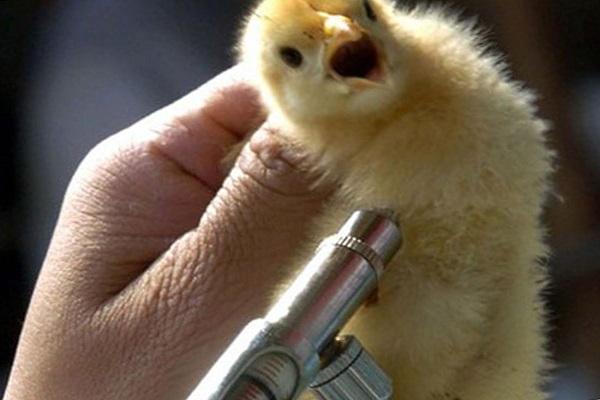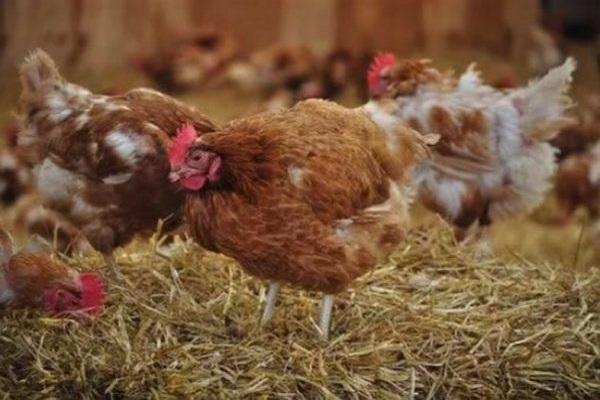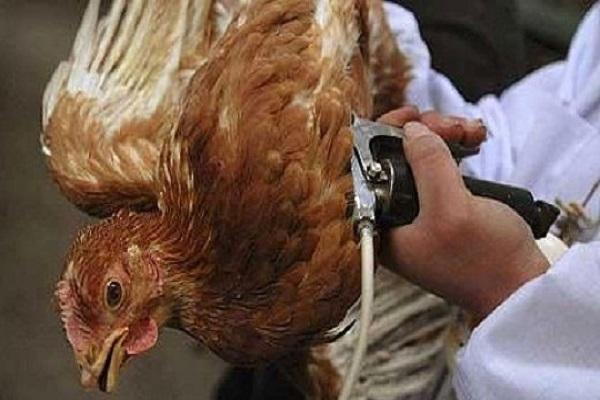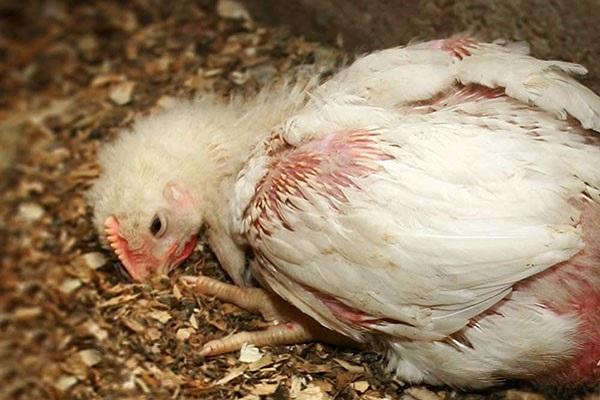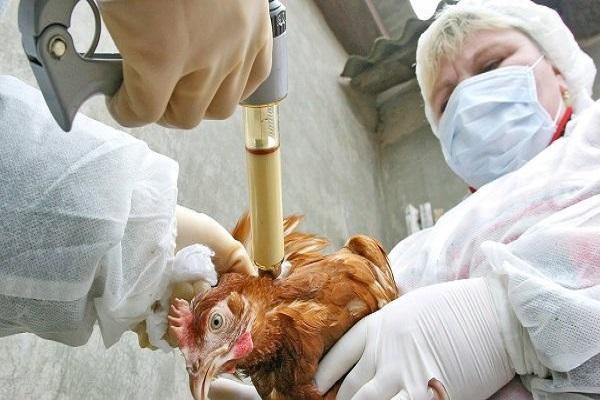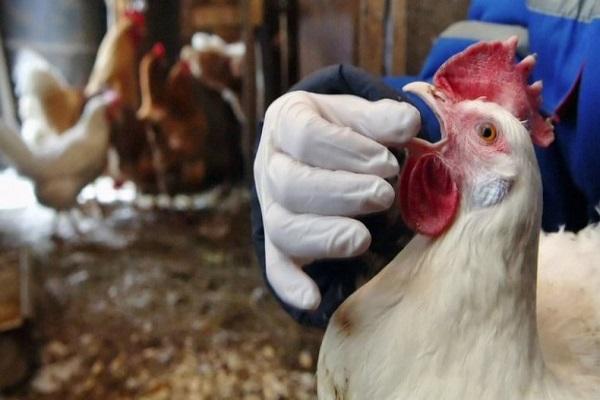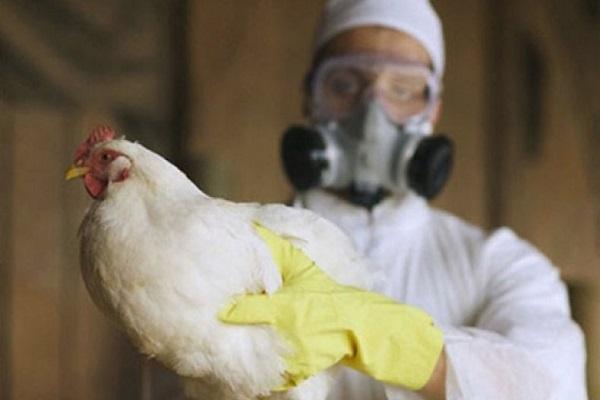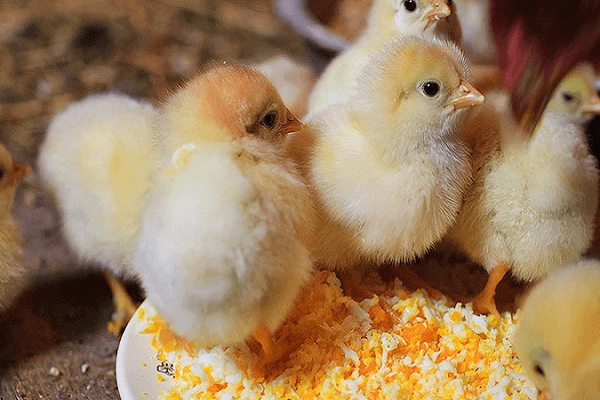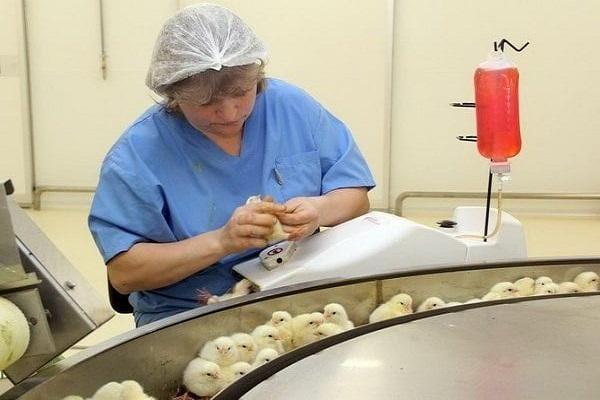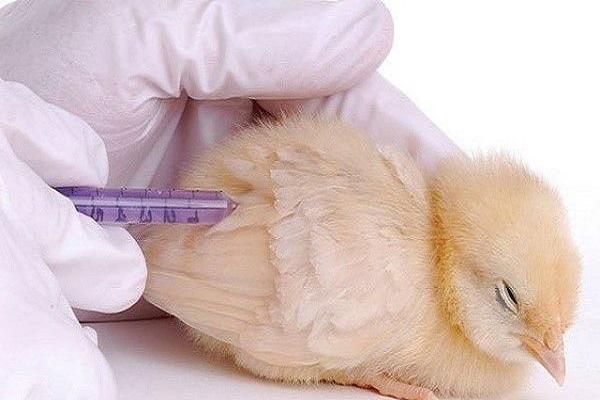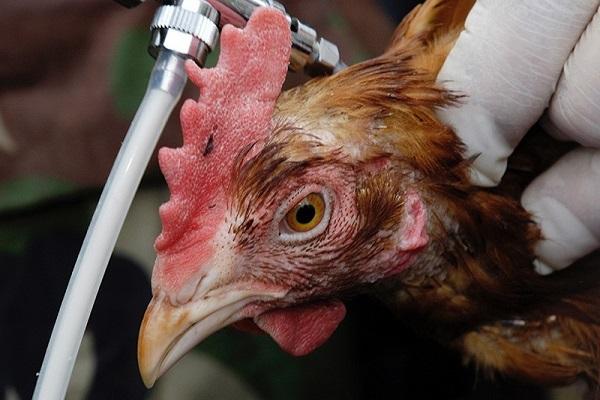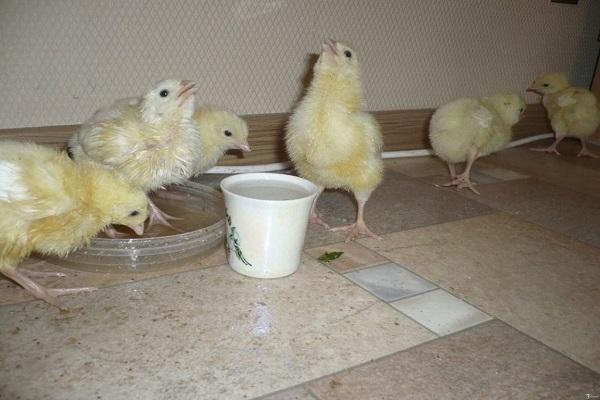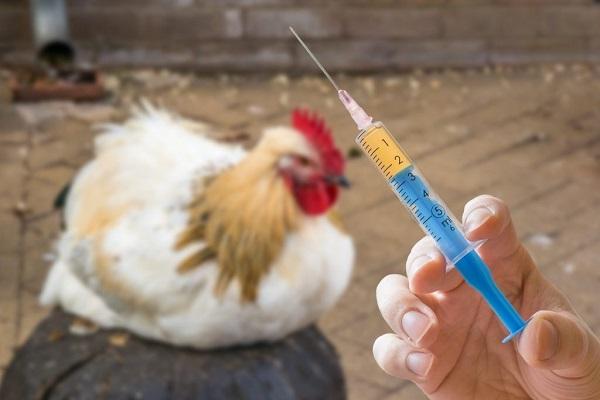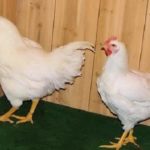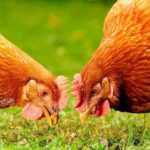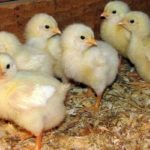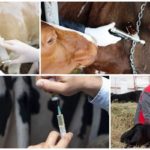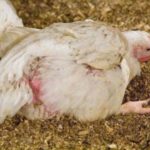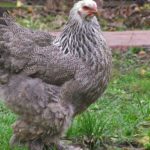Timely vaccination of chickens is considered the key to their health. Thanks to the correct implementation of the necessary vaccinations, it is possible to protect birds from many infectious and viral pathologies. At the same time, many poultry farmers ignore this important event, which leads to dangerous consequences. As a result, the productivity of birds decreases or even their death occurs.
- Why do you need to vaccinate chickens and adult birds?
- What vaccinations are given?
- Specific
- Nonspecific
- What are they vaccinated against?
- On an ongoing basis
- For bronchial infections
- For salmonella
- From the plague
- From adenovirus
- One-time
- Coccidiosis
- Newcastle diseases
- Laryngotracheitis
- Marek's diseases
- How to choose a vaccine
- Common parameters
- Human factor
- Farm location
- Productive orientation of chicks
- Place of purchase
- Calculation of vaccine dosage and amount of water
- How to vaccinate chickens and hens?
- Approximate poultry vaccination schedule
- Intramuscular
- Dropping into the eyes of a hen, laying hen, chick
- Dilution in water
- Using a sprayer
- Injecting the drug into the wing
- Monitoring vaccination results
Why do you need to vaccinate chickens and adult birds?
Vaccination is considered the most effective method of preventing various diseases. Moreover, preventing pathologies is much easier than treating them.
Vaccination can be specific and non-specific. In the first case, vaccinations are aimed at preventing infection. In the second, measures are taken to stop the spread of the disease in a timely manner.
Quite often, vaccines have to be administered already in the first days of life of chicks. However, a more precise schedule should be drawn up by a veterinarian. With the help of the introduction of special drugs, it is possible to prevent smallpox, Newcastle and Marek's disease and many other ailments.
What vaccinations are given?
The procedure is performed using different methods. All vaccinations are divided into 2 categories - specific and nonspecific.
Specific
This term refers to vaccinations that are performed using special medications. To do this, dead or weak strains of microorganisms are introduced into the bird's body. This leads to the synthesis of antibodies. This type of vaccination is used on large farms with a significant number of livestock.
Nonspecific
This is a standard technique that is based on preventive measures. It is as follows:
- introduction of vitamins into the diet;
- isolation of infected chickens;
- bird health assessment;
- quarantine of chicks and recently purchased individuals;
- treatment if the disease develops.
This method requires the poultry farmer to pay more attention to the chickens. Therefore, it is usually used for small farms. In the case of nonspecific vaccination, antibodies are not synthesized in the body of birds. The procedure is aimed at strengthening the immune system and increasing resistance to disease.
What are they vaccinated against?
Vaccination is aimed at preventing various diseases. In some cases, a single administration of the drug is enough, in others, the drugs are used constantly.
On an ongoing basis
In such a situation, medications are recommended to be administered annually. In some cases, it is necessary to use a complex of different agents that are used in the early stages. The exact timing of vaccinations is very difficult to determine. When choosing them, it is worth taking into account the general morbidity rates in the farm and region.
For bronchial infections
This category of pathologies includes different types of infectious bronchitis. The disease provokes a decrease in the general tone of birds. As a result, there is a decrease in weight and egg production parameters. The pathology is life-threatening for birds.
Vaccination is recommended to be carried out in several stages:
- at 5 weeks, use Intervent MAS/clone, which is mixed with clean water;
- at 8 weeks, the Intervent IB4/91 composition is introduced - it is also diluted in water;
- at 10 weeks, Intervent MAspas/clone 30 is used, which is administered by injection;
- at week 11 use Fort Dodge IB Primer D274;
- Before sale, birds use Intervent IBmulti+ND+ED.
For salmonella
Salmonellosis is considered one of the most common diseases among domestic chickens.Transmission of the infection occurs through the oviduct and poses a danger to the human body. It is worth administering the vaccine against the disease multiple times:
- on days 1-2 of life, Lohmann TAD VacE is given, which is mixed with water;
- at week 6 it is recommended to use the same medicine;
- The last time the drug is administered is before sale or a month before slaughter.
From the plague
This vaccine is administered at 3-6 weeks. It is recommended to repeat the procedure every year. For vaccination, a 20% suspension of formol-hydroxyl-aluminum serum is used. There is also a more expensive and effective formol-fetal vaccine, which is used at the same age.
From adenovirus
This infection provokes a decrease in egg production. To prevent infection with the virus, the drug Intervent IBmulti+ND+ED is administered. It is used only for chickens after 2-2.5 months.
One-time
The body's resistance to specific strains of bacterial microorganisms and viruses can be maintained for life. A single use of the vaccine is enough for this. In this situation, the immune system “remembers” the pests. When they encounter them, blood cells neutralize the danger before the infection spreads. It is important to get vaccinated on time.
Coccidiosis
It is worth vaccinating against this disease immediately after the chick is born. In industrial incubators, birds are vaccinated on the first day. At an older age, vaccination will not give results. Coccidiostatic drugs are used for the procedure. They are added to birdseed.
Newcastle diseases
Today, to prevent the disease, the same serum is used as to prevent bronchial pathologies - Intervent MAspas/clone 30. The medicine is administered by injection.
Laryngotracheitis
To prevent the disease, Merial Nemovac is administered by mixing with water. The vaccine is given at 9-10 weeks of life. The causative agent of laryngotracheitis is resistant to primary antibodies of birds. Therefore, at the time of vaccine administration, the chicken must be completely healthy. Otherwise, the risk of infection is high.
Marek's diseases
Only incubator vaccination helps prevent Marek's disease. It is done immediately after the chicks are born or no later than the first day of life.
How to choose a vaccine
To choose an effective drug, you need to take into account many criteria. Only in this case will vaccination be effective.
Common parameters
Vaccinations for laying hens can be mandatory or optional. In the second case, the decision on the advisability of vaccination depends on the following factors:
- the opinion of the poultry farmer - the desire for precautions or a tendency to save;
- place to buy birds;
- purpose of bird breeding;
- epidemiological situation in the region.
Human factor
If a farmer is inclined to save money, he is willing to take some risks. In such a situation, only mandatory vaccines are given. At the same time, it is important to monitor the condition of the birds so as not to miss the development of the disease. It is much easier to cope with the disease at the initial stage.
It is imperative to remain honest with customers. They must be informed regarding the vaccinations that have been given to the chickens.
If a poultry farmer wants to protect his livestock from diseases as much as possible, it is worth doing optional vaccinations.
Farm location
If there is no specific infection on the farm or in the area, it is not necessary to vaccinate against it. To determine the list of dangerous diseases, you should contact the relevant authority - the state veterinary clinic.It is there that you can obtain information regarding the prevalence of pathologies among birds.
It is worth checking for diseases that occur in neighboring areas. Chickens have a fast metabolism. That's why they get sick very quickly. This means that the infection can quickly spread throughout the surrounding area. In such a situation, it is recommended to play it safe.
Productive orientation of chicks
The list of vaccines for laying hens and broiler breeds is different. Meat varieties of birds do not need to be vaccinated against adenovirus, because this infection leads to a decrease in egg production.
It is worth considering that the disease spreads faster among meat breeds. They live in more crowded conditions than egg-laying hens. The list of specific vaccinations depends on specific characteristics.
Place of purchase
The issue of vaccination can be resolved when purchasing chickens. If they are purchased from a poultry farm, you can be sure that the required minimum vaccinations have been carried out.
If birds are purchased from private individuals in small farms, it is worth focusing on their integrity. Therefore, the question of the availability of vaccinations must be clarified in advance. It is worth considering that high-quality and fully vaccinated chickens cannot be cheap.
Calculation of vaccine dosage and amount of water
The number of doses of the drug must match the number of birds on the farm. Some of the drug will be lost in the medicator and water supply line. Therefore, it is worth increasing the volume by 300-700 doses per poultry house.
Calculating the number of vaccines is not that difficult. If you need to vaccinate 23,500 chickens, you should take 6 bottles of the drug, 4,000 doses each. As a result, 24,000 doses will be required per poultry house.
To get the amount of water, you need to use the formula. To do this, the number of chickens should be multiplied by their age in days and by 1.6.The last indicator is the percentage of input on the dispenser.
The calculation of the required amount of clean water should be carried out by a veterinarian or qualified nurse. This is done right in the chicken coop before making the solution.
How to vaccinate chickens and hens?
To vaccinate chickens and broilers at home, you need to focus on many factors. The table shows a graph by age for various diseases:
| Name of the disease | Age of chickens |
| Marek's disease | 1-3 days |
| Salmonellosis | 1-2 days |
| Coccidiosis | 5-7 days |
| Gumboro disease | 20-25 day |
| Infectious bursitis | 28-30 day |
| Newcastle disease | 5 weeks |
| Salmonella Enterica | 6 weeks |
| Mycoplasmosis | 7 weeks |
| Infectious rhinotracheitis | 9 weeks |
| Infectious encephalomyelitis | 13 weeks |
| Escherichia coli | before sale over 2 months of age |
| Reduced egg production syndrome | older than 2-2.5 months |
| Infectious bronchitis | 7-8 weeks |
Certain pathologies require repeated administration of the drug. To avoid the development of illnesses, you need to carefully study the instructions and consult with an experienced doctor.
Approximate poultry vaccination schedule
To achieve good results during vaccination, you should strictly follow the sequence of drug administration.
Intramuscular
When administering the drug using this method, it will not be possible to do without an assistant. Intramuscular medications are used to treat decreased egg production and Marek's disease. To carry out the procedure, you should perform the following steps:
- Prepare the drug. You need to take it out of the ice and draw the daily dose of the drug into an insulin syringe.
- Secure the bird so that it cannot escape.
- Find the insertion area on the chest.Typically the injection is performed 2.5-4 centimeters from the keel bone.
- Wipe the area with a cotton pad soaked in alcohol.
- Insert the syringe at an angle of 45 degrees. The depth should be 1-1.5 millimeters. Gently press the plunger to ensure smooth injection of the substance.
- If a drop of blood appears, disinfect the injection area again.
Dropping into the eyes of a hen, laying hen, chick
When using the tool using this method, you must do the following:
- Prepare the medicine. Remove the drug and solvent from the bottle, then put them into a pipette.
- Secure the chicken, paying attention to the head.
- Drop 0.03 milliliters of the drug into the eyes.
- Hold the chick so that the solution enters the body.
Dilution in water
In this case, do the following:
- For a certain time before vaccination, you should get rid of drinking bowls. By the time the drug is administered, birds should be thirsty.
- Mix the drug with water according to the instructions.
- Immediately after this, give the chickens access to the drinking bowl.
- Make sure that the chickens drink the solution within 1.5-2 hours, otherwise it will become ineffective.
Using a sprayer
To implement this method, you should do the following:
- Dilute the substance according to the instructions. For 100 chickens you will need about 50 milliliters of water.
- Spray the chicks using a coarse or fine aerosol.
- Make sure that the product reaches all birds.
This method is often used in large farms, as it helps to vaccinate an impressive number of birds.
Injecting the drug into the wing
To carry out the procedure, do the following:
- Prepare the vaccine.
- Secure the chicken. To do this, you need to hold the head with your thumb, and move the wing to the side with your middle and index fingers.
- Wipe the injection site with alcohol.
- Inject at an angle of 30 degrees. It is recommended to press the piston very slowly.
- There is a risk of a bubble appearing in the injection area. Over time it will go away on its own.
Monitoring vaccination results
In poultry farming, the quality of the vaccine is monitored. To do this, you should perform the following steps:
- Take 20 chickens from different places.
- Check the shade of the tongue - it should be blue.
- Vaccination is considered completed if at least 90% of birds have a blue crop and tongue.
Empty containers containing the vaccine must be boiled for half an hour. After which it is recommended to dispose of them. If the drug remains, it should be put in the cold.
Vaccination of chickens is a very important event that helps to avoid many problems. With the help of correct and timely administration of drugs, it is possible to protect birds from dangerous diseases and maintain their productivity.

